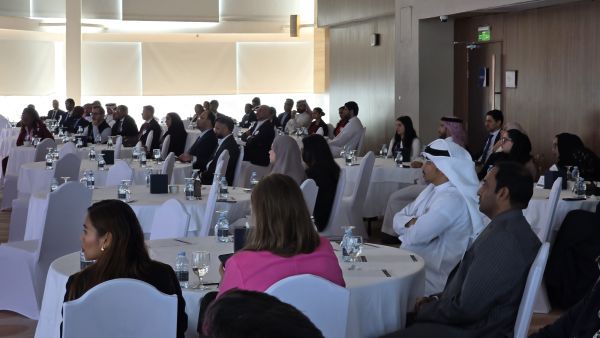KPMG Bahrain Hosts Seminar on the ‘Future of Risk’ at Wyndham Grand Bahrain Bay

Manama, Bahrain – November 2024 – KPMG in Bahrain successfully held an insightful breakfast seminar, "Future of Risk," at the Wyndham Grand, Bahrain Bay. The event brought together industry leaders and experts to discuss the evolving landscape of risk management and its implications for business continuity, growth, and resilience.
The Seminar was led by Ivan Prince, Associate Partner, KPMG Advisory Services, and featured key insights from sector specialists including Suraida Subhi, Associate Director (Financial Services); Ashish Tyagi, Associate Director (Energy and Industrial sector); and Naren Pasupalati, Manager (ESG Manager).
Addressing the gathering, Ivan Prince emphasized, “The risk landscape is becoming increasingly complex due to converging factors such as geopolitical tensions, rapid technological advancements, and regulatory shifts. Businesses must integrate advanced analytics and proactive strategies into their risk frameworks to remain resilient.”
Based on KPMG’s global report ‘Future of Risk - Building a trusted risk function to succeed in a riskier world.’ Jeyapriya Partiban, Partner and Head of Advisory, KPMG in Bahrain stated, ‘it is often a shift within the marketplace, such as regulatory changes, technological advancements, geopolitics, or major incidents (nature based or human-caused), can significantly impact organizations across multiple dimensions. Operationally, they may necessitate rapid adaptation to new processes, potentially leading to disruptions. From a liquidity standpoint, unforeseen shifts or a domino effect from other transitional shifts can strain cash flows, impacting an organization’s ability to meet obligations. Credit risk may escalate as counterparties face similar challenges, increasing the likelihood of defaults. Moreover, failure to effectively manage these transitions can impact an organization's reputation, eroding stakeholder trust. Proactive risk management and strategic planning are essential to navigate these evolving threats.’
Emerging Risk Dynamics:
- The seminar highlighted critical risks such as geo-politics, cyber threats, climate-related challenges, and reputational risks.
- Sectors including the Financial Services, Energy, and Industrial sectors were identified as facing complex transformation pressures.
- Geopolitical risks and the role of generative AI were discussed as pivotal forces reshaping operational resilience.
Reputational Risk Management:
- Drawing examples from global case studies, including high-profile incidents of corporate mismanagement, the team stressed the importance of embedding reputational risk into the enterprise risk framework.
- The importance of proactively managing reputational risk to maintain stakeholder trust and safeguarding long-term value.
Sector-Specific Insights:
- For the Financial Services sector, evolving regulatory demands, cybercrime, and third-party dependencies were identified as top priorities.
- The Energy and Industrial sectors face risks associated with clean energy transitions, supply chain disruptions, and technological vulnerabilities. Agile risk management frameworks will be required to help organizations strategically turn risks into opportunities for value creation.
Digital Transformation in Risk:
- The integration of AI and advanced analytics is revolutionizing risk functions, enabling near-real-time monitoring and enhanced decision-making capabilities.
- Business leaders need to understand that leveraging digital acceleration is not just about compliance but also about innovating their processes and operations to achieve sustainable growth.
The Evolving Role of Leadership:
- With over 61% of executives surveyed anticipating an increase in risk management responsibilities over the next three to five years, fostering a risk-aware culture is paramount.
- The session underscored the need for leaders to align risk strategies with organizational goals to drive resilience and agility.
Insights from the Future of Risk Report:
The seminar drew upon findings from KPMG’s "Future of Risk" report, which surveyed four hundred senior executives globally. Key insights included:
- 67% of respondents acknowledged improved decision-making through integrated risk frameworks.
- AI and generative AI technologies were identified as transformative tools in managing risks.
- Leadership fostering a risk-aware culture was highlighted as the top driver for successful risk transformation.
The "Future of Risk" seminar provided actionable insights for business leaders, equipping them with the knowledge to navigate uncertainty while embracing risk as a strategic enabler.
Background Information
KPMG
Through helping other organizations mitigate risks and grasp opportunities, we can drive positive, sustainable change for clients, our people and society at large.
KPMG member firms operate in 153 countries, collectively employing more than 207,000 people, serving the needs of business, governments, public-sector agencies, not-for-profits and through member firms' audit and assurance practices, the capital markets. KPMG is committed to quality and service excellence in all that we do, bringing our best to clients and earning the public's trust through our actions and behaviours both professionally and personally.





